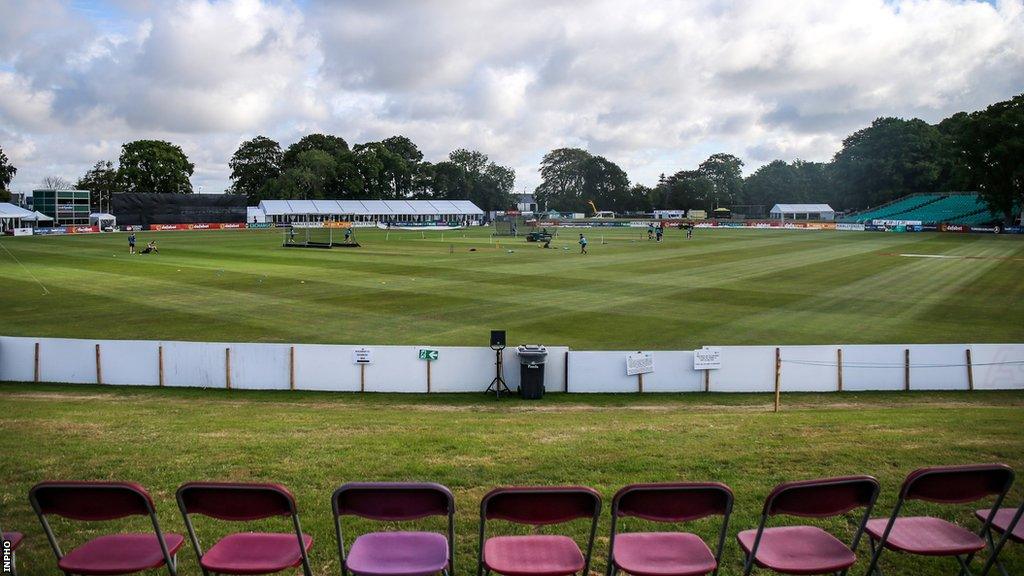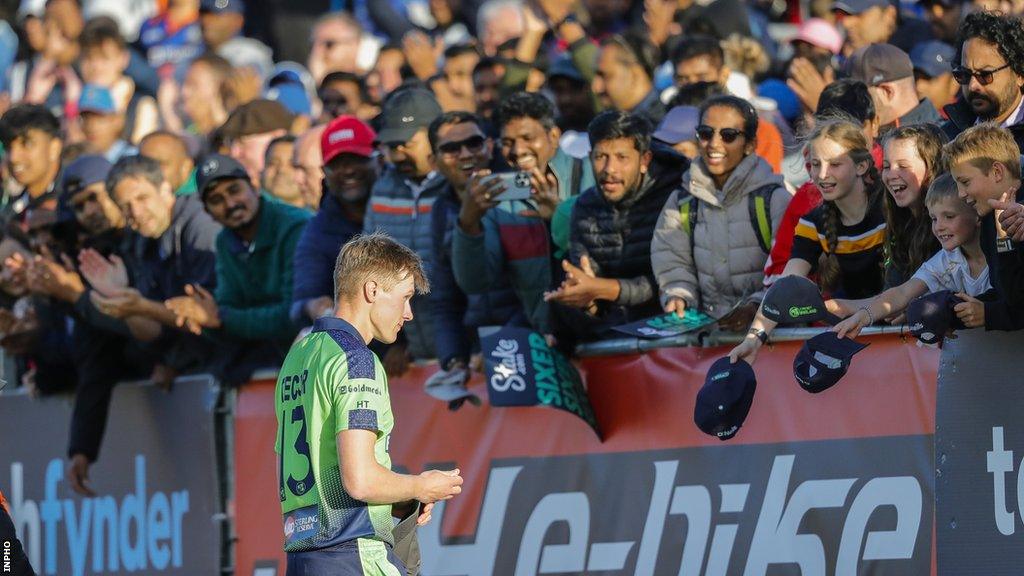Warren Deutrom: Cricket Ireland boss says talks over new Dublin stadium 'serious'
- Published

Ireland have alternated between Malahide (above), Stormont and Bready as the venues for their home internationals
Cricket Ireland chief executive Warren Deutrom says the Irish government is to begin "serious discussions" on the support it will provide to help make a new national cricket stadium a reality.
Deutrom believes Ireland's co-hosting of the 2030 T20 World Cup has piqued the interest of the government.
But he says work at the National Sports Campus venue would have to begin by next year for it to be ready by 2030.
Deutrom said the government had "fired the starting pistol" to begin talks.
"There's a long way to go but this is a very important step," Deutrom told BBC Sport Northern Ireland.
"The government in November confirmed the intention to build a stadium in due course.
"The next cab off the rank for us was to ensure the degree of urgency that it was going to be developed as quickly as possible and the government's announcement around that over the weekend was obviously terrific because it means we can crack on seriously to look at the feasibility of this."
Stadium plans announced in 2018
Cricket Ireland initially announced plans in 2018 for a new stadium at the Sport Ireland Campus in Dublin but the project was always going to be dependent on significant government financial support and Deutrom believes the prospect of this happening has now moved significantly closer.
"The government has a policy of wanting to attract major sporting events so I've no doubt in my mind that it [co-hosting the 2030 T20 World Cup] helped focus the government's attention on making sure, here was a reason that we don't miss out," he added.
"One of the key considerations when the government is looking at its major events roster, whether it be a Rugby World Cup, European football championships, obviously the Ryder Cup in Adare Manor in 2027 is that all take place or would take place outside the National Sports Campus.
"We're bringing the opportunity to bring the world's second biggest sport, its marquee event at the National Sports Campus and I think that's something we can bring as a point of difference probably to all of the other major sports."
World-class facilities at the National Sports Campus already include the National Aquatics Centre while planning permission for a new velodrome at the venue was granted earlier this month.
In November, Irish Minister of Sport Jack Chambers said the Sport Ireland Campus should be "the home of Irish sport" and Deutrom says Cricket Ireland's vision tallies with this.

Sell-out crowds of 8,000 watched Ireland's game against India at Malahide last June
"The vision that we have needs to cleave very closely to Sport Ireland's and the government's own vision for infrastructure on the campus which is going to be 'world class'," he said.
"Realistically, we're not looking at the MCG (Melbourne Cricket Ground) of a 90,000 seater and probably even a 50,000 seater like the Aviva Stadium is going to be too ambitious."
Deutrom pointed out that a capacity 8,000 crowd attended the two Twenty20 internationals against India at Malahide last June.
"We sold out in about 24 or 48 hours. We always ask ourselves 'what if we kept selling and how far could we get for our biggest games?'.
"When you consider that the broadcast reach for those games was up in the region of 200 million worldwide. Those are numbers which other sports probably only dream about.
"It's the biggest sport in the world for about 20 to 25% of the world's population so we are a very, very significant sport.
"And what we are doing in a way is using our global visibility to try and drive the sense of being a major sport here."
'Over £1m spent annually on temporary facilities'
Cricket Ireland spends over £1m annually to erect temporary facilities at their current international venues - Malahide, Stormont and Bready.
"If we could invest that back into people and programmes and assisting our clubs to be able to develop their own infrastructure, that would be a much better use of our money," added Deutrom.
"There's also the environmental impact of lorries transporting the temporary equipment all over the country."
Deutrom says the volume of cricket at international level both in the men's and women's games at senior and youth level plus the various interprovincial competitions mean that the current venues will still be required for international contests.
"There's something like 80-plus fixtures at professional level that we play so it's important to reassure our other stakeholders and venues around the country whether it be Stormont, Malahide, Bready that we are still going to need their facilities."